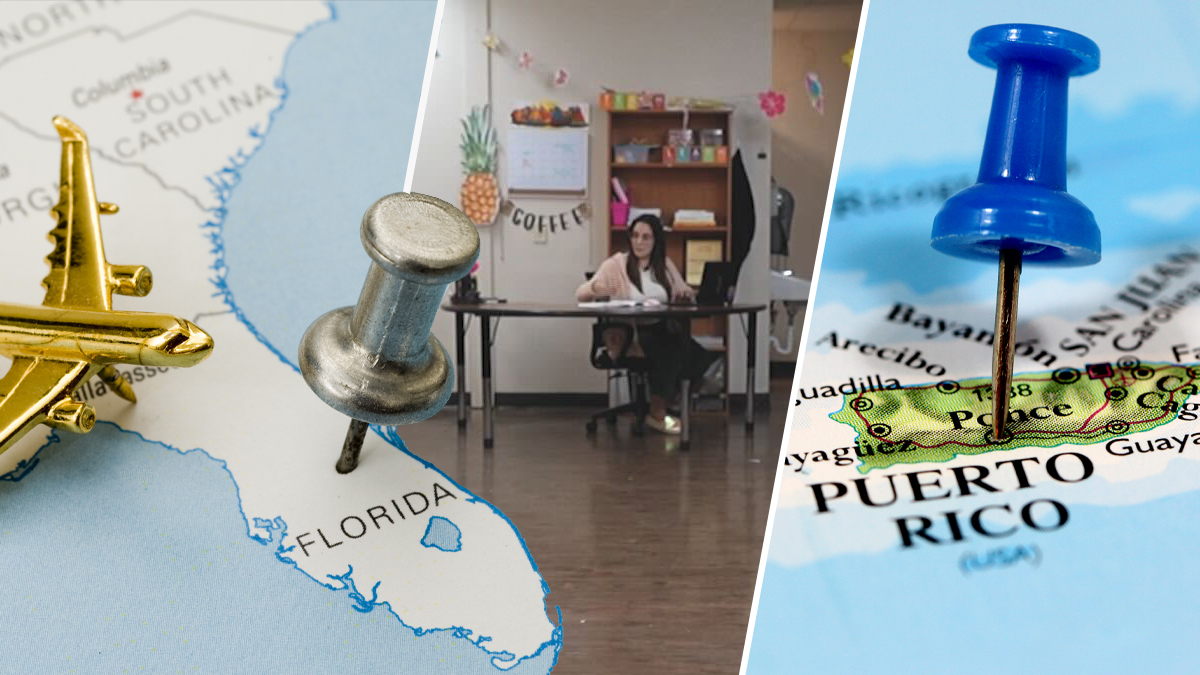Orlando Florida. – When necessity knocked on Doris Ortiz’s door in Puerto Rico, she knew she had to pack up her bags and emigrate from the island.
He traveled 1,179 miles north, nearly three hours, and settled in Osceola County, Florida. It didn’t take long for her to find a job because her teacher’s license fully complied with state requirements.
“The need led me to seek a new place to live in search of a new future and a way to continue to be independent… (And although) It’s a little scary, you do it with fear because like I’ve always told my kids; fear paralyzes…” Ortiz admitted.
The 59-year-old teacher is among the statistics of thousands of educators who have left the island for the United States over the past decade.
A Puerto Rico Institute of Statistics report indicates that in 2013 there were just over 29,000 teachers in the island’s Department of Education. In less than ten years, this number has been reduced by more than 6,000 teachers.
There is an advantage both for the state and for Puerto Rican teachers who have studied education on the island, since the certification is automatic and for the system “it’s a step forward”; they have more certified teachers in less time to hire, Ortiz explained.
Another crucial factor in Ortiz’s job search was his fluency in English and Spanish as a large portion of Central Florida’s population, as 26.8% of the state’s population is Hispanic or Latino, according to CENSUS data.
However, there is another reason why more and more Puerto Ricans are being recruited into Florida school districts. there is a serious shortage of teaching staff.
According to the Florida Education Association (FEA), there are approximately 5,300 teacher shortages in the state.
Karla Hernández from FEA commented that “(the current teacher shortage) is something we have never seen in history and we know it is a condition that continues to grow. We need teachers.”
“From Puerto Rico to Florida”: the teacher recruitment plan to join the diaspora
Many educators who emigrated from the island went to Florida, Texas and New Jersey.
In fact, Osceola, Polk, Lake, St. Lucie, and Lee School Districts in Florida chose to travel to Puerto Rico and host job fairs.
As recently as March 2023, the Polk County School District held a job fair in San Juan, the capital of the archipelago.
St. Lucie and Lee counties have also followed suit. The first assured that it was the first time that they moved to make this type of contract. The second already has seniority and since 2018 they have hired more than two score teachers. In 2018 alone, 23 teachers joined its workforce.
Meanwhile, Osceola County — home to the city of Kissimmee and where Hispanics make up 56 percent of the population — the school district made at least two trips.
In their efforts to hire Puerto Ricans at these fairs, they made more than 30 job offers for the 2023-2024 school year, according to data provided by Osceola School District Superintendent Debra Pace.
“We have really worked hard over the past two years to expand our recruiting efforts in Puerto Rico. For example, in October we were on the island for two days and offered over 30 contracts, most of them for the 2023 to 2024 school year,” Pace said.
Possible solution to Florida’s teacher shortage
Florida Counties are clear that given the urgent need for educators in the state, there is a need for people who want to relocate to do so immediately.
Since Puerto Ricans have been US citizens since 1917, they do not need a passport to enter the United States. It’s faster and easier to find them, according to people interviewed by Telemundo 31.
“We recruit teachers even in Puerto Rico because that’s the solution. We need more teachers to help children progress academically…Puerto Ricans are important because they are already citizens and do not need passports. They can get here right now,” Osceola County School Board member Julius Melendez said.
Also, the fact that many people on the island are bilingual stands out.
Fernando Rivera, from the Puerto Rico Research Center at the University of Central Florida, pointed out that in the region “there is a greater need for bilingual people and many teachers (from Puerto Rico) have made this decision to have stability in their professional career and we see that there is immigration”.
However, it must be emphasized that the reasons for the shortage of educators in the United States are due to resignations and early retirements due to burnout and frustrations experienced by teachers, according to the National Research Center for Education Statistics of the States -United. .
Among the various surveys carried out to try to identify the reasons for the departure of teachers, another of the reasons that stands out is student discipline.
Is it worth moving from Puerto Rico to Florida?
The Florida Education Association realized that in five years the number of vacancies had doubled. There were 4,961 positions available for 2021.
The entity maintains that the main reason for the lack of teachers is the salary and the classrooms full of students.
As a result, Florida Governor Ron DeSantis approved a salary increase for teachers in March 2022. From around $40,000 in 2020, the base salary rose to $47,000.
By contrast, a teacher on the island can earn $2,750 a month before deductions, or about $33,000 a year, after the government of Pedro Pierluisi, governor of Puerto Rico, passed a measure to raise the base salary. educators to, among other things, slow down the flight of teachers a little.
Despite the salary increase in Florida, for Johanna López —Representative for District 43 in the Florida House of Representatives — a teacher must earn less than $60,000.
A teacher does not work only eight hours. The teacher also corrects at home. He stays after school. The teacher also brings many problems home after work
Johanna López, Representative for Florida’s 43rd District
However, Meléndez believes that “here (Florida) we have a better salary and we can guarantee a pension. A few years ago they had a financial crisis on the island (in Puerto Rico) and they didn’t know if they could keep all the commitments they had made with the government and here we can guarantee you a better retirement.”
Despite the fact that in Florida a teacher earns more than in Puerto Rico, the reality for many who have already moved is different, or at least it is for Juan Omar Villegas.
The teacher, who has a doctorate in education, does not earn the salary he once earned in Florida as a teacher in Polk County. Despite everything, he prefers to be a teacher in his native country.
“I worked at Polk and my payment method was monthly, but that was a time when what you charged didn’t pay off. Rent is expensive and when you put it on a scale you wonder: is it that I’m better off here or should I come back because even if the pay isn’t better I can live,” he said.
Villegas has returned to work as a teacher at the Doctor José Antonio Dávila school and although he has a second job which helps him even in battle, he does not regret it. However, he gave advice to those with emigration in mind: “It’s never a bad thing to try, but go ahead with a clear mind because if you have uncertainty, you risk to come back.”

For his part, Wilfredo Cardona, principal of the Adela Rolón Fuentes school, moved to Orange County with his family in 2016. He entered the school system as a substitute teacher and, although he had been better paid, he returned to his country.
“I arrived in Florida without a job and it was not so easy to get a job as a teacher… teachers in Puerto Rico have nothing to envy and I say they are the same and maybe better, but in terms of resources we can’t even compare with them (the people of Florida). They are better than us… but here we don’t live worrying about a shooting. Other things will happen , but not that,” said Cardona, who has been an educator for more than a decade.
Holiday or professional teachers? Not necessarily
The search for teachers in Puerto Rico was not the only measure to alleviate the lack of teachers in Florida.
DeSantis has launched a plan that allows anyone with a high school diploma or been in the military the opportunity to become a teacher.
For ex-military members, they must have served at least four years, have at least 60 college credits and a 2.5 GPA.
However, the governor’s plan is not welcomed by all.
“It’s normal for other people with other titles to enter the profession, but we feel this is an attack on our profession. You should think strategically and you should think that we need high quality teachers. We are going to invest so that we have better teachers and they have a better monetary reward,” said Karla Hernandez, president of the FEA.
In addition, police officers, firefighters and paramedics were also included in this measure.
Eligible professionals do not have to pay to pay for the state teacher certification exam, they will have an initial $4,000 premium and, if they teach in subjects where there is a shortage of teachers , they will have an additional bonus of $1,000.
In addition, teachers who wish to mentor candidates who wish to become teachers will have a bonus.
It’s a proposition we know he’s making because he sees we’re bleeding and tries to cover it up with a band-aid. It will dilute what is a teaching profession
Karla Hernandez, FEA President
However, not everyone sees it that way. For those who come in search of better life opportunities, they understand that this is an opportunity “a super mega important opportunity because it allows others to grow in different areas”.
In Florida, of 591,461 college courses, 59,117 were taught by teachers without subject certification. That’s 10% of all classes, according to data from the Florida Department of Education.
The teacher shortage in America is a national trend. From the White House, proposals have been launched to address the need affecting the education of minors.
Jill Biden, the nation’s first lady, mentioned that part of the solutions are state incentives for teachers, with increases coming from federal funds similar to the US bailout. Reduce barriers for those wishing to teach and encourage the younger generation to enter the profession.
While all of this is going on, Ortiz, who this story began with, continues to hold out hope for those who will one day leave their country.


